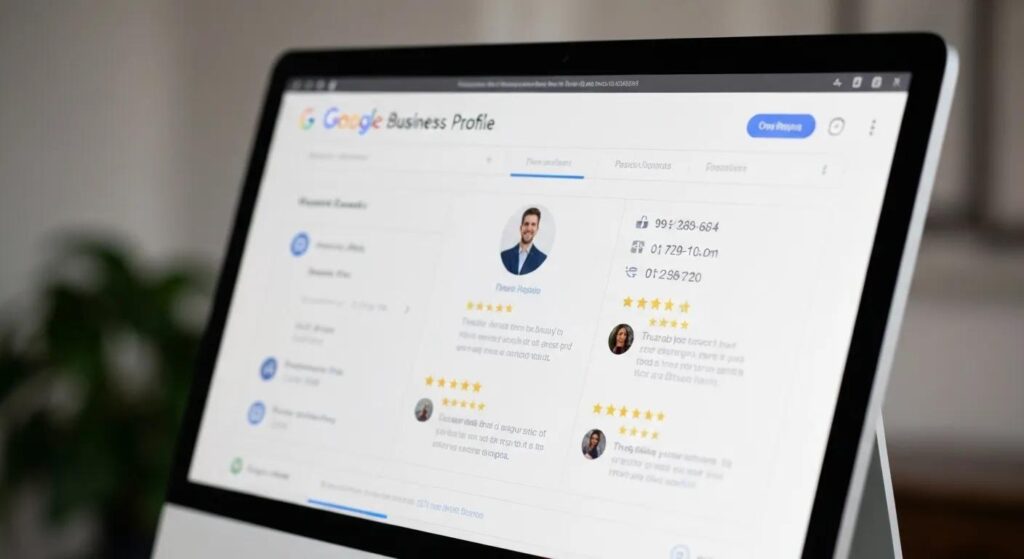Unlock Local Growth: Essential SEO Strategies for Small Businesses
Local SEO is your secret weapon for boosting visibility in location-specific searches, driving more foot traffic, and ultimately, growing your revenue. Many small businesses struggle to compete with large national players in search results, resulting in missed opportunities with valuable local customers. This guide dives deep into proven SEO tactics for small businesses, covering seven key areas: the basics of local search, mastering your Google Business Profile, clever on-page optimizations you can do yourself, building authority off-page and technically, budget-friendly service options, tracking your progress, and the latest innovations shaping local SEO. By combining these insights with the expert SEO services from Astound Media, you’ll get a clear roadmap to enhance your online presence, capture more local leads, and achieve lasting growth. Implementing SEO best practices for SMBs is crucial for this journey.
“SEO is no longer a ‘nice-to-have’ for small businesses; it’s a fundamental necessity for survival and growth in today’s competitive digital landscape. By focusing on location-specific strategies, businesses can connect directly with the customers most likely to convert, driving tangible results and building a loyal local following.” – Jorge Leger, Founder and Digital Marketing Consultant, Astound Media.
What Exactly Is Local SEO and Why Is It a Game-Changer for Small Businesses?
Local SEO helps your business get noticed in local searches by fine-tuning location-based signals. This means more people walking through your door and more qualified leads. By focusing on keywords tied to your location, your Google Maps listing, and what customers are saying about you, local SEO connects you with nearby customers actively looking for what you offer. Adhering to SEO best practices for SMBs ensures these efforts are practical.
Imagine a local bakery ranking for “best croissants near me” and turning those searches into happy customers within hours.
How Does Local SEO Give Your Google Maps Ranking a Boost?
- NAP Consistency is Key – Ensure your business Name, Address, and Phone number are consistent across all online platforms. This tells search engines you’re legit.
- Proximity Signals Matter – Weave location-specific keywords into your page titles and descriptions to match searches from people nearby.
- Reviews Drive Visibility – A steady stream of positive customer reviews tells Google your business is a top choice.
Consistently nailing these ranking factors will make your business pop up more on Google Maps, setting the stage for even better results with your Google Business Profile. These are fundamental SEO best practices for SMBs.
The Undeniable Power of Online Reviews for Local SEO
Google’s online reviews are a massive asset for local SEO. Google’s algorithm pays close attention to the number of reviews you have, their quality, and how frequently you receive them. In fact, a recent study showed that over 90% of shoppers consider reviews a major factor in their buying decisions.
This highlights just how crucial online reviews and local citations are for building trust and relevance with both customers and search engines. Mastering these elements is part of comprehensive SEO best practices for SMBs.
What’s the Big Deal with Google Business Profile for Local SEO?

Your Google Business Profile (GBP) is the cornerstone of your local online presence. It’s where verified business details and customer interactions appear directly in search results. When managed effectively, it turns searches into real leads by clearly showing your location, hours, services, and what customers think.
A strong GBP not only anchors your local SEO but also sends powerful authority signals back to your website, thereby boosting your overall search performance. This is a key component of SEO best practices for SMBs.
How Google Business Profile Significantly Impacts Small Business SEO
Google Business Profile signals are identified as the top driver for ranking in the Local Pack and the fourth most critical factor for overall local search results. Key elements, such as selecting the right primary category and incorporating keywords into your business title, can significantly enhance your visibility for relevant searches.
This research directly backs up the importance of optimizing your Google Business Profile to maximize local visibility and attract high-quality traffic. These optimizations are core SEO best practices for SMBs.
How Can Small Businesses Leverage Local Citations and Online Reviews?

Local citations and reviews are vital for proving your business’s existence and performance across the web, boosting your relevance and authority. Citations confirm your core business information, while reviews sway customer decisions and build algorithmic trust.
By consistently building citations and encouraging genuine customer feedback, small businesses strengthen their local online presence and create a solid foundation for long-term SEO authority. This is a fundamental aspect of SEO best practices for SMBs.
How to Optimize Your Google Business Profile for Maximum Visibility?
Getting your Google Business Profile (GBP) dialed in ensures you get seen in local search and map results. This involves verifying your listing, refining your content, and actively engaging with customers. This approach significantly increases your chances of landing in that coveted “local pack” and driving valuable traffic. Following these steps is essential for SEO best practices for SMBs.
What Are the Must-Do Steps to Verify and Set Up Your Google Business Profile?
- Claim or create your GBP, making sure all your business details match your official website exactly.
- Complete the verification process (via postcard, phone, or email) to unlock all editing capabilities.
- Choose the most accurate primary and secondary categories to best represent your services.
- Fill in your business hours, service areas, and specific attributes (like “wheelchair accessible”) to match what people search for.
Getting your setup and verification right is the crucial first step for ongoing optimization and building credibility in local search.
How to Master Managing and Responding to Customer Reviews?
- Acknowledge Every Review – Always thank customers for positive feedback and address any concerns raised in negative reviews.
- Weave in Keywords Naturally – When you reply, mention your products or services to reinforce relevance.
- Resolve Issues Publicly – By showing you can solve problems, you build trust and encourage more reviews.
Actively managing reviews signals to both customers and search engines that you’re responsive and reliable, strengthening your local authority.
What Are the Best Practices for Adding Photos, Posts, and Services to Your Profile?
Keeping your GBP fresh with engaging media and up-to-date posts makes it more informative and appealing to potential customers.
- Stunning Photos – Upload high-quality images of your interior, exterior, and products. Use descriptive alt text that includes location or service keywords.
- Regular Updates – Share news about promotions, events, and new offerings to keep your listing current in search results.
- Detailed Service Listings – Clearly describe each service, including pricing and relevant keywords, to guide customer decisions.
Consistently updating your profile shows activity and keeps your listing prominent, leading us smoothly into the next set of DIY SEO tactics.
What Are the Most Effective DIY SEO Strategies for Small Businesses?
DIY SEO empowers small businesses to attract organic traffic without breaking the bank. It focuses on innovative keyword research, refining your website’s content, and optimizing your multimedia. These tactics boost your relevance, accessibility, and overall engagement. Understanding and applying these SEO best practices for SMBs can yield significant results.
How to Conduct Local Keyword Research to Target Your Niche Audience?
Keyword research is how you discover the exact terms your ideal customers use when searching, guiding your content creation and optimization efforts.
- Use tools like Google Search Console to find high-intent search queries that include location modifiers.
- Dive into competitor websites to identify related terms and long-tail keyword opportunities.
- Organize keywords by user intent, informational, navigational, or transactional, and prioritize your pages accordingly.
Precise keyword targeting leads to higher conversion rates because your content perfectly matches what local searchers are looking for.
What Are the Key On-Page SEO Techniques for Small Business Websites?
On-page SEO is all about optimizing individual web pages to make them more relevant for specific search queries.
- Title Tags & Meta Descriptions – Include your primary and secondary keywords, along with local modifiers (e.g., “best pizza in Chicago”).
- Header Structure – Use H1 for your main topic and H2/H3 tags for subtopics to make content easy to scan.
- Internal Linking – Connect related pages using descriptive anchor text that includes service or location terms.
These on-page tweaks strengthen your keyword signals and improve the user experience, making it more likely you’ll achieve higher rankings.
How to Optimize Images and Multimedia for Better SEO Performance?
Optimizing your visual assets not only speeds up your website but also reinforces your content’s relevance.
- Compress Files – Keep image file sizes below 200 KB to improve page speed and mobile performance.
- Descriptive Filenames & Alt Text – Use hyphenated keywords in filenames (e.g., chicago-deep-dish-pizza-delivery.jpg) and alt text that clearly describes the image, including local context.
- Responsive Formats – Serve images in modern formats like WebP or AVIF for faster loading on compatible browsers, balancing quality and speed.
Well-optimized multimedia enhances accessibility, user engagement, and search engine understanding, preparing your site for more advanced authority-building tactics.
How to Build Authority with Technical and Off-Page SEO for Small Businesses?
Technical and off-page SEO work together to build trust and credibility. This means ensuring your website is fast and accessible, and cultivating high-quality backlinks that signal your industry expertise. Implementing these advanced SEO best practices for SMBs is key to long-term success.
Why Is Mobile-Friendliness and Page Speed Vital for Small Business SEO?
A website that looks great and loads quickly on mobile devices is crucial for user experience and meets Google’s mobile-first indexing standards.
- Responsive Design – Use flexible layouts and media queries to ensure your content adapts seamlessly across all devices.
- Minify Code – Reduce the file sizes of your CSS, JavaScript, and HTML to speed up how quickly pages render.
- Lazy Loading – Defer loading images and other media that aren’t immediately visible to prioritize the loading of essential content.
Fast, responsive websites keep visitors engaged and reduce bounce rates, directly contributing to better search rankings.
How to Implement Schema Markup to Enhance Search Engine Understanding?
Schema markup provides search engines with clear definitions of your content, helping them display richer results like snippets and knowledge panels.
- Add the LocalBusiness schema to your homepage, including your name, address, telephone, and opening hours.
- Use Service markup on your service pages to detail offerings, pricing, and hasOfferCatalog.
- Implement the Review schema on your testimonials section to showcase average ratings and the number of reviews.
Structured data clarifies your content’s purpose and increases the likelihood of appearing in featured snippets, driving more qualified traffic to your site.
What Are Effective Link Building and Content Promotion Strategies?
Building off-page authority involves earning relevant backlinks and strategically distributing your content.
- Local Partnerships – Collaborate with community blogs, chambers of commerce, and suppliers to create co-created content and directory listings.
- Guest Contributions – Offer expert articles to industry publications, naturally embedding links back to your website.
- Social Amplification – Share your blog posts and infographics on social media and relevant online communities to earn shares and backlinks.
A balanced approach to acquiring links and promoting your content solidifies your site’s authority and expands its reach across the digital landscape.
What Affordable SEO Services Can Small Businesses Use to Accelerate Growth?
Small businesses can benefit significantly from specialized SEO services that deliver tangible results, freeing up internal teams to focus on core business operations. Partnering with experts ensures adherence to SEO best practices for SMBs.
How Can Professional SEO Agencies Help with Local SEO and Google Business Profile?
Agencies bring specialized knowledge, advanced tools, and ongoing management to fine-tune your local SEO signals at scale. They perform in-depth audits, implement sophisticated schema markup, and expertly manage your GBP interactions, ensuring sustained visibility without straining your internal resources.
What Are the Typical Costs and ROI of Small Business SEO Services?
Monthly retainers typically range from $500 to $2,000, depending on the scope of work, which can include keyword research, on-page optimization, technical SEO, and off-page strategies. A well-executed SEO strategy can yield a 3x to 5x return on investment within six to twelve months by increasing organic traffic and local conversions.
How to Choose the Right SEO Service Provider for Your Small Business?
Look for a partner with a proven track record, transparent reporting, and a strategy tailored to your unique business. Examine their success stories in local SEO, client testimonials, and communication methods to ensure they align perfectly with your growth goals.
How to Monitor and Measure SEO Success for Small Businesses?
Continuously tracking your performance is key to refining your strategy, uncovering trends, and identifying areas for improvement across both local and organic search channels. Consistent monitoring is a cornerstone of SEO best practices for SMBs.
What Tools Should Small Businesses Use for SEO Performance Tracking?
- Google Search Console – Monitor indexing status, search queries, and any mobile usability issues.
- Google Analytics – Track user behavior, traffic sources, and goal completions on your website.
- Local Rank Trackers – Measure your rankings in map packs and organic search results for your target keywords.
Using these tools together provides a comprehensive overview of your SEO health and highlights actionable insights for optimization.
How to Interpret Key SEO Metrics and Adjust Strategies Accordingly?
- Organic Click-Through Rate (CTR) – This metric indicates how effectively your titles and descriptions capture attention and drive clicks.
- Conversion Rate – This measures how well your website traffic is turning into valuable leads or sales.
- Bounce Rate & Dwell Time – These indicate how relevant your pages are and how engaged users are with your content.
Regularly reviewing these metrics ensures your SEO efforts directly contribute to the business’s real-world performance.
What Are Common SEO Challenges and How to Overcome Them?
Small businesses often grapple with limited budgets, resource constraints, and intense competition. Tackle these by prioritizing high-impact activities (like GBP optimization and local content creation), leveraging free tools, and focusing on niche keywords where you can establish strong authority.
What Are the Latest Trends and Innovations in Small Business SEO?
Keeping up with emerging trends ensures your local online presence remains competitive as search technology continues to evolve. Embracing new trends is part of staying current with SEO best practices for SMBs.
How Is AI Transforming Keyword Research and Content Creation?
AI-powered tools can now generate extensive keyword insights, identify related semantic clusters, and even draft content outlines that align perfectly with search intent. This significantly speeds up the research process and helps create content that satisfies complex user queries.
Why Is Voice Search Optimization Important for Local Businesses?
Voice searches often use natural, conversational language and question-based phrases, “What’s., “What’s the best pizza place open now?” Optimizing your content for natural language and providing clear, FAQ-style answers ensures you capture this growing segment of mobile and smart-speaker users.
How Can Video Content Boost Small Business SEO and Engagement?
Video enhances the user experience and increases the time visitors spend on your site, sending strong engagement signals to search engines. Embedding short explainer videos on service pages and sharing helpful tutorials on YouTube can boost your visibility in both standard and video search results.
By implementing these essential best practices and embracing new tactics, small businesses can achieve local search dominance, turn more inquiries into loyal customers, and secure sustainable growth. For expert guidance tailored to your specific needs, connect with our team today and discover how specialized SEO services can elevate your local presence and deliver measurable results.
About the Author
Jorge Leger is the Founder of Astound Media, a New York-based digital agency specializing in strategic web design and marketing for organizational growth. As a Digital Strategist and Marketing Consultant, he brings over a decade of experience in WordPress, SEO, and automation. Jorge partners with mission-driven organizations, small businesses, and nonprofits to deliver measurable results in online presence and campaigns, with a particular expertise in helping small businesses and nonprofits expand their reach. Connect with Jorge on LinkedIn.




